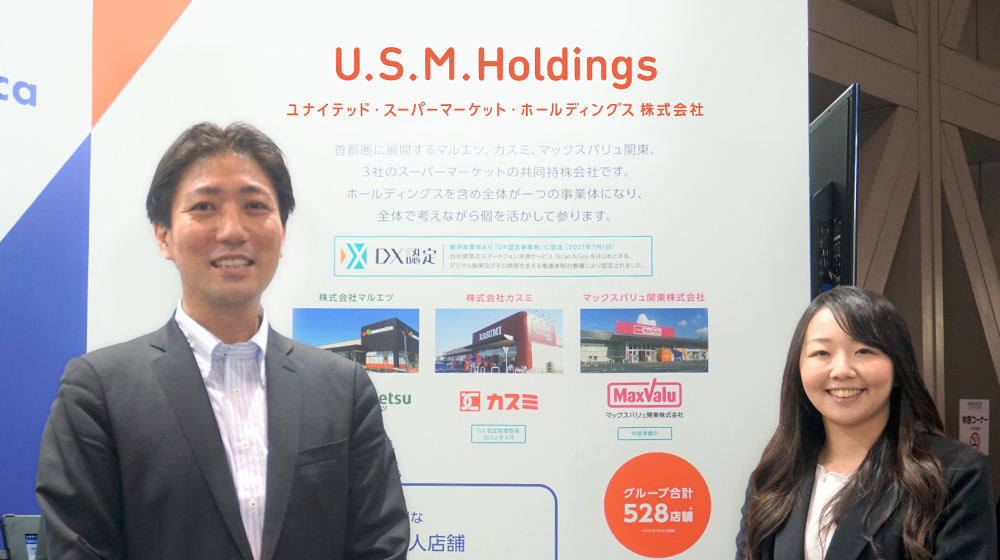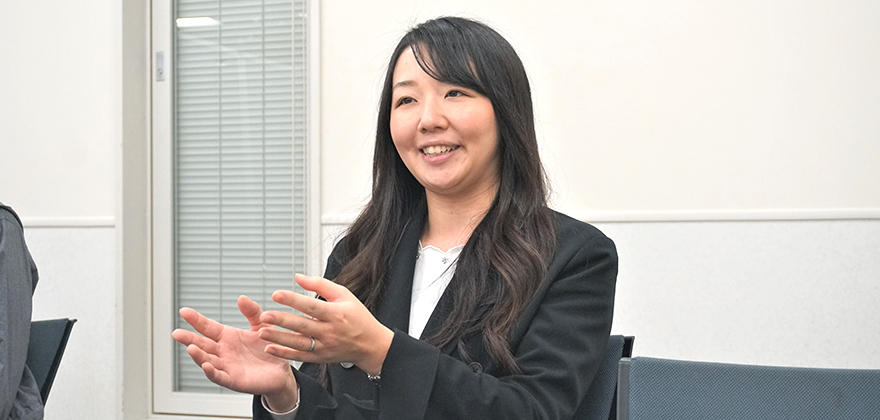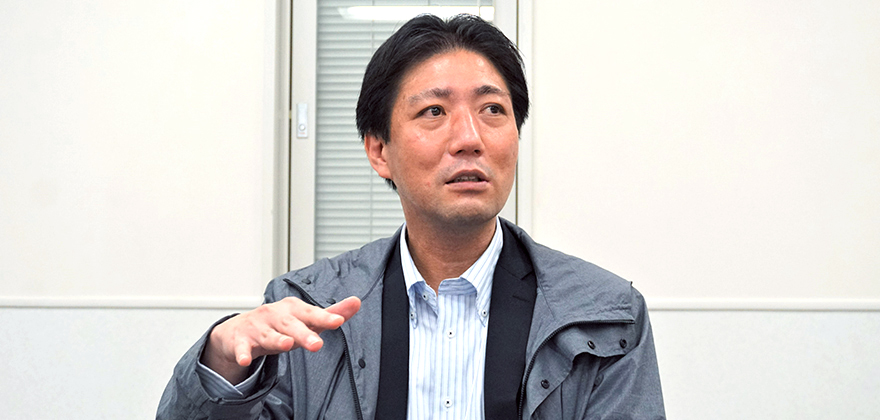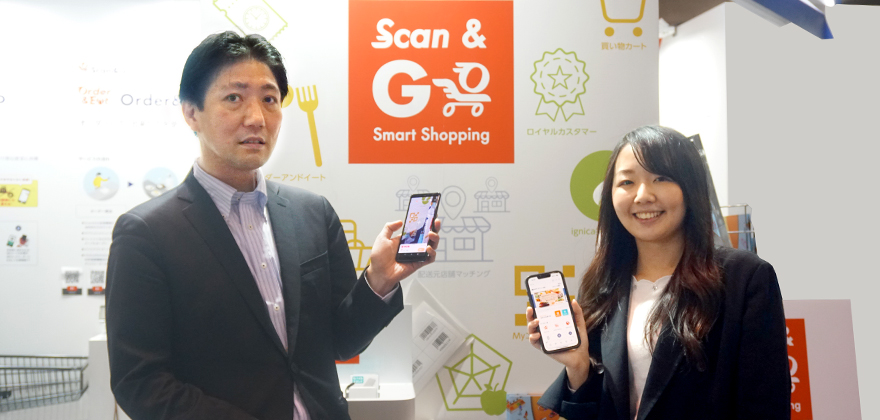United Super Market Holdings Inc.

Rikkeisoft's IT Engineers: Adapting Seamlessly to Japanese Businesses
GUEST SPEAKER
United Super Market Holdings Inc.
VP, Digital Transformation Dept.; Program Manager, Online Delivery Bureau - Mr. Daisuke Kawasaki (left) Digital Transformation Dept., DX Planning Bureau - Ms. Chie Hirose (right)
United Super Market Holdings Inc. (“U.S.M.H.”) is a joint holding company comprising Maruetsu, Kasumi, and Maxvalu Kanto supermarkets in the Tokyo Metropolitan Area. Recently, U.S.M.H has launched the digital brand “ignica”, promoting digital-based structural reform and focusing on developing various services that lay the foundation for the next generation.
To enhance ignica’s service, U.S.M.H. works daily to provide customers with new solutions through partnerships with domestic and international companies. Specifically, many services are now available to provide consumers with a superior shopping experience, such as “Scan & Go”, a smartphone application that allows customers to shop without having to wait at the cash register; “Online Delivery”, which lets customers order products online, have them delivered and/or available for in-store pick-up; and “Order & Eat”, allowing customers to order dishes from in-store food corners (in-store dining and delivery). Offshore companies like Rikkeisoft play a major role in developing these solutions.
In the retail industry, “localization” is strictly required, meaning cultural differences among countries are greatly reflected. This can be a tall hurdle for offshore development. We talked with Kawasaki and Hirose, responsible for the development of ignica at U.S.M.H., about their company’s solution to this issue, offshore development in Vietnam, and the support from Rikkeisoft.
Developing proprietary retail systems as products and services
Please describe the Digital Division’s business operations as well as your duties
Mr. Kawasaki: The Digital Division of U.S.M.H. is responsible for expanding and enhancing the services and functions of the digital brand “ignica” and developing an external sales business to sell developed products and services to external customers. My main task in the division is to develop the “Online Delivery” feature.
Ms. Hirose: As for me, in addition to leading the development of the “Order & Eat” feature, I’m also the design team lead, so I’m involved in designing the app’s UI alongside branding-related design and CI management.
How is the offshore development system in your company structured?
Mr. Kawasaki: ignica’s development is based on the Agile methodology. A project team is set up for each feature, and staff from U.S.M.H.’s members and various partner companies participate in that project. As for digital policy, we welcome multiple development companies from many different countries as partners based on our standpoint of risk diversification.
With Rikkeisoft, we work together to develop business-use smartphone applications and web pages. Even for more difficult projects, we can still work with them with so much trust, to the point that we even consider requesting Rikkeisoft’s IT engineers to do them without our guidance.
A willingness to thoroughly understand local Japanese customs, values, and purchasing behavior
What is the key reason you give Rikkeisoft's IT engineers the priority to deal with more difficult tasks?
Mr. Kawasaki: In offshore development, we find “cultural differences” extremely difficult to work with in many ways. This may include differences from supermarket products and services to software development quality requirements. Sometimes, it can even be development procedures depending on the situation. During such times, Rikkeisoft’s IT engineers are highly adaptable to such “cultural differences” thanks to their seriousness and dedication toward their work.
On our first commission, they had already worked so hard, even on minor revisions, that we were worried about how far they would take this project. We even had to remind them that it was okay to call it a day and get back to it tomorrow. I had a strong impression that they were very hardworking people.
Since it’s the retail industry, it’s very important for IT engineers to have a deep understanding of Japan's unique shopping culture, don’t you think?
Mr. Kawasaki: That’s right. I believe there must be differences in the contents and methods of service between Vietnamese and Japanese supermarkets. That’s why the “normal”, as in “what a supermarket would normally do,” is the first thing to differ, in my opinion.
Ms. Hirose: In situations like that, we had had the experience of teams working on their own interpretation, even when it wasn’t explicitly stated as a requirement. This ended up as something completely different from what we expected.
Mr. Kawasaki: It would still be good if we could notice the difference, but it would be a real problem if the process happened to be hidden and “unknown features” were implemented without us knowing about them. Fortunately, Rikkeisoft’s IT engineers are always willing to ask us for a proper review before rushing in. I think they have just the right sense of balance.
Ms. Hirose: An example of cultural differences is that we once needed a function that reflected the reduced tax rate on the selling price of a product based on the selected pick-up method. We explained in detail that the consumption tax rate varies depending on whether it’s eat-in or takeout, but we still had difficulty getting people to understand the concept. Indeed, you wouldn’t fully grasp how the reduced tax rate works if you’ve never eaten in a supermarket in Japan.
Later on, we had a similar request for Rikkeisoft. Whenever they had doubts, even the slightest one like “When is this used?”, they would check with us about use cases and situations even we hadn’t noticed. I was impressed with how well they understood the assignment and created exactly what we requested.
Having no concerns about communication and comprehension is a big plus.
Do you think language plays an important role in solving miscommunication?
Mr. Kawasaki: Definitely. We can work with Rikkeisoft’s teams completely in Japanese, so it’s very comfortable and easy to work with them. At other companies, there were cases in which they told us that their Bridge System Engineers (BrSEs) could use Japanese.
However, they were more like interpreters with insufficient technical knowledge for a BrSE. With Rikkeisoft, the BrSEs actively listen to our requirements, organize the content, and then compile it into a proposal, giving us a different level of peace of mind.
Are there any problems in working between Japan and Vietnam?
Mr. Kawasaki: In the past few years, remote meeting has become the norm, making geographical distance a non-issue. However, the inability to physically check the system’s operation poses a challenge to our project. In software development, sometimes things don’t run smoothly in real life despite working fine during testing. Because of this, having an offshore development team makes sharing information regarding on-site implementation issues difficult. Currently, we have the staff create test-mode screens to break down the cause of the problem.
On the other hand, Rikkeisoft has their System Engineers (SEs) come to Japan and work on-site sometimes to understand the requirements of new features properly. That was when I thought they were such an active company. I heard that they attended morning and evening meetings when they received training at our office and even answered the phone for us when it rang. The members were all amazed, they just couldn’t imagine a non-employee going that far! (laughs)
On the other hand, is there anything that you feel is good because it’s different?
Ms. Hirose: This “difference” might sound a bit off-topic, but I personally feel that the two-hour time difference between Japan and Vietnam is just right. It takes us about an hour in the morning to reply to accumulated messages, and Rikkeisoft in Vietnam starts work 1 hour earlier than us. This allows us to communicate with their team during our break.
Moreover, they often have longer lunch breaks in Vietnam, and the workday ends a little later. So even when it’s time for us to clock out or start working overtime, Rikkeisoft still has two hours left before the end of their workday. It’s easier to contact them for confirmation or requests.

“Although the feeling of a language barrier sometimes exists when working with people from other countries, we are able to communicate smoothly by visualizing what we wanted to convey.” – Ms. Hirose
With Rikkeisoft, we would like to spread a new style of shopping experience
What matters to you when it comes to selecting and evaluating offshore destinations?
Mr. Kawasaki: A lot comes to mind, but we wouldn’t know anything if we didn’t try it first. That’s why instead of suddenly assigning a big job to a new company, we test them with a pilot project. We can see how things go in a real-life collaborating situation during the process. Can we communicate well with each other? Are meetings carried out smoothly? Can information be shared thoroughly? Are they managing their time and work properly? It is important that service quality is of a certain level as a partner, even if it’s offshore.
I’m sure engineers are well aware of Quality - Cost - Delivery (QCD). Still, if there’s a delay in the process, the customer, their end user, and their stakeholders will be impacted. It’s important to keep that in mind when you take action, isn’t it?
Mr. Kawasaki: I agree. If you just develop a system without having the end user in mind, you can’t create a good one.
Our projects are conducted with the Agile methodology. In software development, we seek partners willing to go beyond the company’s boundaries to work together for a successful project rather than simply being a contractor and contracted party. This requirement also applies to offshore development partners. It’s a very high priority for us to be able to brainstorm with our partners about what kind of service we can provide to the end user.

“In an Agile development team, it’s important even for development partners to share a common sense of purpose in terms of achieving business goals.” – Kawasaki.
You initially had in-depth discussions/negotiations/consultations about the contract to accommodate the Agile development system, right?
Mr. Kawasaki: Yes. Our company adopts Agile, in which development proceeds while we try out various things. Therefore, a general contracting agreement would require a large workload outside the project’s scope to ensure smooth progress.
Due to this, we decided to discuss beforehand what kind of contract the two companies would sign. From that, in a contract that ensures the amount of workload for a period of time, we would list out everything we wanted to do. And we would choose what to prioritize at that moment from the list while picking up the tempo of the development.
What would you like to work on for U.S.M.H. in the future?
Mr. Kawasaki: We hope to promote a new shopping experience to everyone through the digital transformation of our supermarkets. It would be severely limiting if we only considered Japanese knowledge and culture as inspiration for our digital experiences. Since we are already doing offshore development, having unique ideas from each country would be great. With Rikkeisoft, for example, if they were to propose new and interesting services inspired by Vietnamese culture and history, it could further broaden the scope and vision of our initiatives.

Customer Profile

